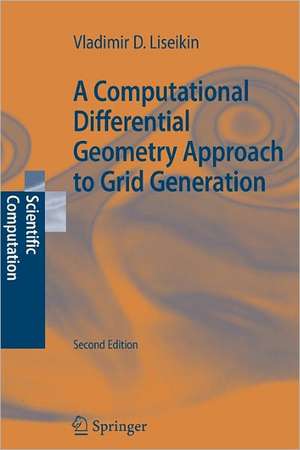A Computational Differential Geometry Approach to Grid Generation: Scientific Computation
Autor Vladimir D. Liseikinen Limba Engleză Paperback – 22 noi 2010
- Employing geometric and numerical analyses of monitor metrics as the basis for developing efficient tools for controlling grid properties.
- Describing new grid generation codes based on finite differences for generating both structured and unstructured surface and domain grids.
- Providing examples of applications of the codes to the generation of adaptive, field-aligned, and balanced grids, to the solutions of CFD and magnetized plasmas problems.
| Toate formatele și edițiile | Preț | Express |
|---|---|---|
| Paperback (1) | 1108.51 lei 6-8 săpt. | |
| Springer Berlin, Heidelberg – 22 noi 2010 | 1108.51 lei 6-8 săpt. | |
| Hardback (1) | 1113.09 lei 6-8 săpt. | |
| Springer Berlin, Heidelberg – 24 aug 2006 | 1113.09 lei 6-8 săpt. |
Din seria Scientific Computation
- 18%
 Preț: 1021.05 lei
Preț: 1021.05 lei - 18%
 Preț: 743.27 lei
Preț: 743.27 lei - 18%
 Preț: 889.75 lei
Preț: 889.75 lei -
 Preț: 387.96 lei
Preț: 387.96 lei - 20%
 Preț: 902.04 lei
Preț: 902.04 lei -
 Preț: 400.85 lei
Preț: 400.85 lei -
 Preț: 386.61 lei
Preț: 386.61 lei - 15%
 Preț: 654.62 lei
Preț: 654.62 lei -
 Preț: 380.25 lei
Preț: 380.25 lei - 18%
 Preț: 1111.34 lei
Preț: 1111.34 lei -
 Preț: 452.62 lei
Preț: 452.62 lei -
 Preț: 389.31 lei
Preț: 389.31 lei - 18%
 Preț: 950.03 lei
Preț: 950.03 lei - 15%
 Preț: 649.22 lei
Preț: 649.22 lei - 18%
 Preț: 787.26 lei
Preț: 787.26 lei - 18%
 Preț: 942.63 lei
Preț: 942.63 lei - 15%
 Preț: 505.18 lei
Preț: 505.18 lei -
 Preț: 389.70 lei
Preț: 389.70 lei - 15%
 Preț: 653.00 lei
Preț: 653.00 lei - 18%
 Preț: 957.44 lei
Preț: 957.44 lei - 15%
 Preț: 653.98 lei
Preț: 653.98 lei - 15%
 Preț: 643.99 lei
Preț: 643.99 lei - 15%
 Preț: 649.39 lei
Preț: 649.39 lei -
 Preț: 388.13 lei
Preț: 388.13 lei - 18%
 Preț: 958.38 lei
Preț: 958.38 lei - 18%
 Preț: 1129.52 lei
Preț: 1129.52 lei - 18%
 Preț: 967.56 lei
Preț: 967.56 lei - 15%
 Preț: 700.75 lei
Preț: 700.75 lei -
 Preț: 401.03 lei
Preț: 401.03 lei - 15%
 Preț: 597.99 lei
Preț: 597.99 lei -
 Preț: 385.62 lei
Preț: 385.62 lei -
 Preț: 394.87 lei
Preț: 394.87 lei -
 Preț: 385.08 lei
Preț: 385.08 lei - 18%
 Preț: 1106.63 lei
Preț: 1106.63 lei - 15%
 Preț: 504.17 lei
Preț: 504.17 lei - 15%
 Preț: 596.36 lei
Preț: 596.36 lei - 15%
 Preț: 653.98 lei
Preț: 653.98 lei
Preț: 1108.51 lei
Preț vechi: 1351.83 lei
-18% Nou
Puncte Express: 1663
Preț estimativ în valută:
212.12€ • 226.82$ • 176.86£
212.12€ • 226.82$ • 176.86£
Carte tipărită la comandă
Livrare economică 18 aprilie-02 mai
Preluare comenzi: 021 569.72.76
Specificații
ISBN-13: 9783642070624
ISBN-10: 3642070620
Pagini: 308
Ilustrații: XIV, 294 p. 81 illus., 3 illus. in color.
Dimensiuni: 155 x 235 x 16 mm
Greutate: 0.44 kg
Ediția:Softcover reprint of hardcover 2nd ed. 2007
Editura: Springer Berlin, Heidelberg
Colecția Springer
Seria Scientific Computation
Locul publicării:Berlin, Heidelberg, Germany
ISBN-10: 3642070620
Pagini: 308
Ilustrații: XIV, 294 p. 81 illus., 3 illus. in color.
Dimensiuni: 155 x 235 x 16 mm
Greutate: 0.44 kg
Ediția:Softcover reprint of hardcover 2nd ed. 2007
Editura: Springer Berlin, Heidelberg
Colecția Springer
Seria Scientific Computation
Locul publicării:Berlin, Heidelberg, Germany
Public țintă
Professional/practitionerCuprins
Geometric Background to Grid Technology.- Introductory Notions.- General Coordinate Systems in Domains.- Geometry of Curves.- Multidimensional Geometry.- Algorithms and Applications of Advanced Grid Technology.- Comprehensive Grid Models.- Inverted Equations.- Numerical Implementation of Grid Generators.
Textul de pe ultima copertă
The process of breaking up a physical domain into smaller sub-domains, known as meshing, facilitates the numerical solution of partial differential equations used to simulate physical systems. This monograph gives a detailed treatment of applications of geometric methods to advanced grid technology. It focuses on and describes a comprehensive approach based on the numerical solution of inverted Beltramian and diffusion equations with respect to monitor metrics for generating both structured and unstructured grids in domains and on surfaces. In this second edition the author takes a more detailed and practice-oriented approach towards explaining how to implement the method by:
- Employing geometric and numerical analyses of monitor metrics as the basis for developing efficient tools for controlling grid properties.
- Describing new grid generation codes based on finite differences for generating both structured and unstructured surface and domain grids.
- Providing examples of applications of the codes to the generation of adaptive, field-aligned, and balanced grids, to the solutions of CFD and magnetized plasmas problems.
Caracteristici
Geometric methods in grid generation is a fairly recent subject with many applications in scientific computing So far the literature on the subject is sparse Includes supplementary material: sn.pub/extras
















